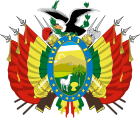You can help expand this article with text translated from the corresponding article in Spanish. (December 2009) Click [show] for important translation instructions.
|
 |
|---|
|
|
The current Constitution of Bolivia (Spanish: Constitución Política del Estado; English Political Constitution of the State) came into effect on 7 February 2009 when it was promulgated by President Evo Morales,[1][2] after being approved in a referendum with 90.24% participation. The referendum was held on 25 January 2009, with the constitution being approved by 61.43% of voters.[3]
It is the 17th constitution in the country's history;[4] previous constitutions were enacted in 1826, 1831, 1834, 1839, 1843, 1851, 1861, 1868, 1871, 1878, 1880, 1938, 1945, 1947, 1961, and 1967.
The 2009 Constitution defines Bolivia as a unitary plurinational, and secular (rather than a Catholic, as before) state, formally known as the Plurinational State of Bolivia. It calls for a mixed economy of state, private, and communal ownership; restricts private land ownership to a maximum of 5,000 hectares (12,400 acres); and recognizes a variety of autonomies at the local and departmental level. It elevates the electoral authorities to become a fourth constitutional power; introduces the possibility of recall elections for all elected officials; and enlarges the Senate. Members of the enlarged National Congress will be elected by first past the post voting in the future, in a change from the previous mixed member proportional system. The judiciary is reformed, and judges will be elected in the future and no longer appointed by the National Congress. It declares natural resources to be the exclusive dominion of the Bolivian people, administered by the state. Sucre will be acknowledged as Bolivia's capital, but the institutions will remain where they are (executive and legislative in La Paz, judiciary in Sucre). The electoral authorities will be situated in Sucre.
- ^ El Mercurio (2009-02-08). "Evo Morales promulga la nueva Constitución y proclama el "socialismo comunitario"". Retrieved 2009-02-12. [dead link]
- ^ BBC World News (2009-02-07). "Bolivia promulga nueva Constitución". BBC News. Retrieved 2009-02-12.
- ^ Corte Nacional Electoral. "Referéndum Nacional Constituyente 2009". Archived from the original on 2009-02-03. Retrieved 2009-02-09.
- ^ Yahoo! News (2009-02-08). "Características de la nueva Constitución boliviana". Retrieved 2009-02-08.[permanent dead link]